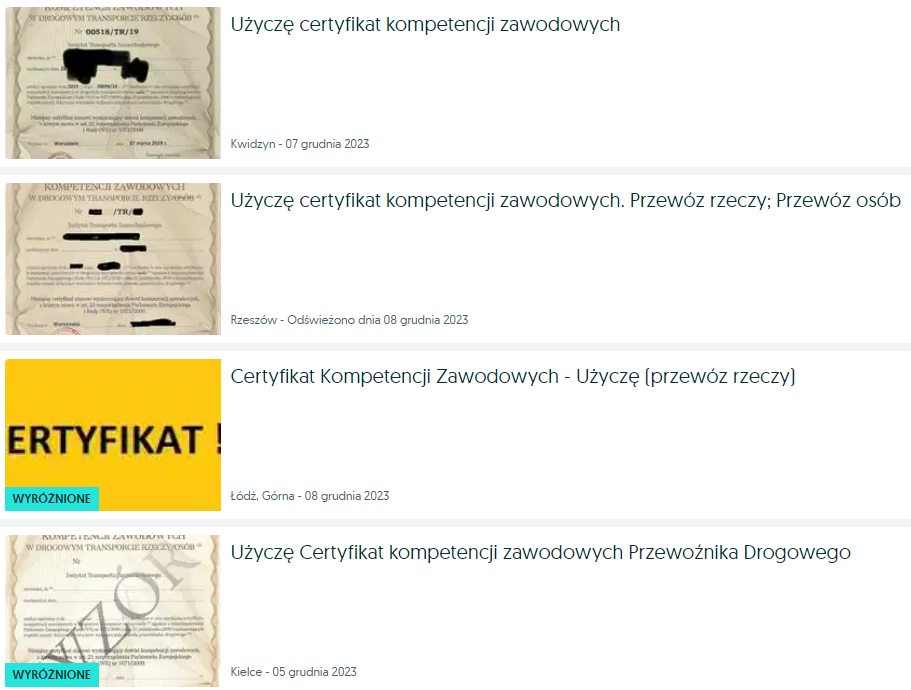What is a certificate of professional competence?
A certificate of professional competence is a document that signifies that the holder has the appropriate knowledge and qualifications to provide road transport services. This certificate must be held by at least one person who manages a company or road transport in a company. It is only by passing the state exam that you can obtain a certificate, which in turn allows you to apply for a permit to practice as a road carrier and obtain transport licenses.
We wrote in detail about what a certificate of professional competence is, what it is used for and who must have one in our article. Click to read!
What if no one in the company is certified?
Maybe you’re just about to start a transportation company, or maybe the person who used to manage transportation in your company has given notice? Either way, it means that this important gap needs to be filled. Basically, there are two ways to do it. The former is optimal and geared toward long-term performance, while the latter is rightly controversial.
Way one: get certified
Obtaining a certificate of professional competence requires passing an exam, but this is not an easy matter. The exam is reputed to be complicated (the sheer duration – four hours – provides some information) and requires diligent preparation. To take the exam, you must sign up for the date indicated on the Motor Transport Institute’s website. Exams are organized regularly in large Polish cities (Warsaw, Poznan, Katowice, Bydgoszcz, Gdansk or Wroclaw), several times a month.
Check out the schedule of upcoming exams on the Road Transport Institute website !
What are the costs of the exam and the issuance of the certificate?
Just taking the exam is a cost in the order of PLN 500. To this amount should be added a fee for issuing the certificate of 300 PLN. A less tangible but equally real cost is the necessary study materials for the exam – such as textbooks.
The largest part of the cost, of course, is the course – these are offered in various forms:
- E-learning. The participant receives materials from which he then studies for the exam. The cost of such a variant is about PLN 1,000, although slightly cheaper offers can also be found online.
- Online course. Participants connect with the organizer via an instant messenger such as Zoom or Google Meet – they receive digital materials and have the opportunity to take part in discussions and ask questions of the presenters, The cost of this option ranges from £1500-2000.
- Residential course. Participants meet at a location designated by the organizer and take part in the workshop. Such a course is the most expensive, but direct participation for many people is the only way to acquire knowledge more easily. The cost of a stationary course is usually between £2,000 and £3,000.
In terms of courses, it is worth noting the duration – many are organized in a highly condensed form, such as a few days. This is an advantage on the one hand, since it doesn’t take long to complete the course, but a disadvantage on the other. Trying to fit the amount of material needed to pass an exam into a short period of time means that lectures can last up to 10 hours a day, which definitely does not make it easier to absorb knowledge. It is worth paying attention to this and thinking about choosing perhaps a more expensive, but more affordable course, in which the lectures will be divided into a larger number of days, and thus it will be easier to actually learn something.
Way two: “lending” a certificate of professional competence
The regulations also provide another option for using a certificate of professional competence – this is Art. 7c of the Road Transport Law, which reads:
An entrepreneur may, without appointing a transport manager who meets the conditions referred to in Article. 4 paragraph. (1) of Regulation (EC) No. 1071/2009, by contract, appoint a natural person authorized to perform the tasks of transport manager on its behalf, if this person meets the conditions referred to in Article. 4 paragraph. 2 of Regulation (EC) No. 1071/2009.
It is this article that is the cause of much confusion and has led to the term “lending” certificate of professional competence. Why do we take this word in quotation marks? Polish law does not mention the actual lending of the certificate. Each document is personal – assigned to a specific person, so it can only be used by someone who has passed the aforementioned exam. “Lending,” as it is often referred to, is in fact the practice of using a person with a certificate of professional competence. What does it look like in practice?
Lending a certificate of professional competence in practice
A company that wants to provide road transport services must designate at least one person whom it designates as responsible for transport management. This employee (although not necessarily bound by an employment contract with the company) organizes or supervises the organization of transportation, delegates tasks related to this area and manages human resources assigned to specific tasks.
But it doesn’t stop there – the transport manager is also responsible for transport documentation and the technical condition, insurance and inspection of vehicles, which are part of the company’s fleet. Thus, there is a lot of responsibility on this person, which, by the way, is one of the reasons why obtaining a certificate of professional competence is so challenging.
Thus, the aforementioned article of the Road Transport Law allows for the possibility of appointing by contract an individual authorized to perform the tasks of a transport manager on its behalf, but the prerequisite is that he meets the criteria referred to in Art. 4 paragraph. 2 of Regulation (EC) No. 1071/2009. What are the criteria?
The person who manages transportation on behalf of the entrepreneur:
- manages the transportation operations of this enterprise on a real and continuous basis,
- has a real connection with the enterprise, consisting, for example, of being its employee, director, owner or shareholder, or managing it, or if the entrepreneur is an individual, is that person,
- Has a residence in the community.
These three conditions make the way some entrepreneurs use the services of those with a certificate of professional competence illegal.
On the web, it is not difficult to come across advertisements in which individuals offer to “lend” a certificate for a small fee. However, the content of these announcements indicates that it is not a matter of actually taking a job, but only of providing the relevant signatures in exchange for a salary:

Why is there such a rash of announcements? After all, there must be some limitations! Limits, yes, exist, but they apply to civil law contracts.
If you want to hire a transportation manager on a contractual basis, he or she can take on the duties provided that the total number of entities for which he or she works does not exceed four, and the total size of the fleet of vehicles to be managed does not exceed 50.
So where is the problem? The restrictions we have written about do not extend to employment contracts – which is why there are so many ads offering a contract for, say, ⅛ of a full-time position.
Important!
A clear line must be drawn here between the unquestionable transportation management service that a certified employee actually performs, and the illegal practice of making one’s certificate available only to ostensibly meet the company’s conditions for providing road transportation services.
What are the penalties for lending a certificate of professional competence?
The current tariff provides for fines for violations in the amount of:
- From PLN 50 to PLN 12,000 for the carrier,
- From PLN 200 to PLN 2,000 for the transport manager.
Note, however, that these penalties will be assessed for each violation separately. If four deficiencies are found, the company risks close to PLN 50,000. Inspections can be carried out repeatedly, and as a result, fines can also multiply.
It’s also worth knowing that the Road Transport Law was amended in 2018. According to the regulations updated at the time, the misdemeanor mode of imposing fines was changed to an administrative mode, which in practice significantly reduces the time for imposing fines. The inspecting institution no longer has to justify the reasons for the penalty – it is enough to show irregularities.


